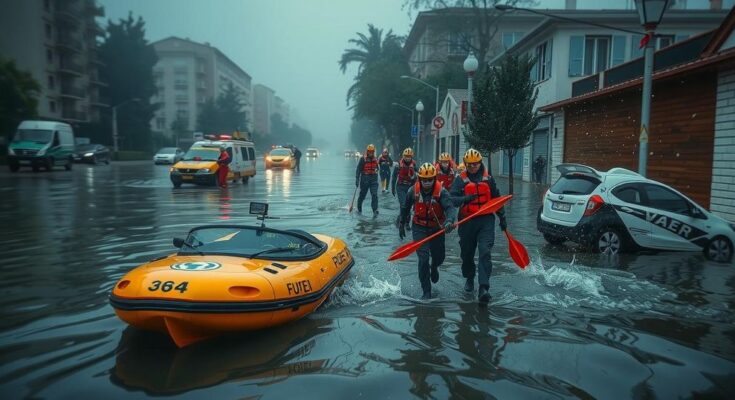Spain faces a calamity following historic flash floods that resulted in at least 95 fatalities and left thousands without services. As rescue operations continue in Valencia, the disaster highlights deficiencies in warning systems and the urgent necessity for improved emergency responses amid climate change challenges.
Spain is currently grappling with the aftermath of devastating flash floods, described as the worst natural disaster in the country this century, which claimed the lives of at least 95 individuals. As search operations continue, an indeterminate number of individuals remain unaccounted for, exacerbating the nation’s distress. The destruction witnessed across the Valencia region resembles that left in the wake of a strong hurricane or tsunami, with entire villages submerged and infrastructure severely damaged. In neighborhoods such as Barrio de la Torre, wrecked vehicles and debris litter the streets, and rescue efforts are compounded by the extensive loss of power and water in the area. Ground crews, alongside military personnel and local emergency responders, have been conducting thorough searches house by house. This rippling disaster has left thousands without essential services and has blocked roads, trapping hundreds of vehicles and individuals. Helicopter rescue operations have reportedly saved around 70 people and facilitated recovery efforts leading to the discovery of 22 bodies as of the latest updates. Prime Minister Pedro Sánchez has arrived in the region to oversee recovery efforts, and the nation has entered a three-day mourning period for the victims. There are growing concerns regarding the timeliness of emergency alerts, as critics highlight the delayed issuance of flood warnings until after the flooding had already commenced, raising questions about preparedness and response to such natural calamities. This event, which scientists attribute to climate change impacts such as rising sea temperatures and increasing drought conditions, has drawn attention to the vulnerabilities faced by communities in Spain, particularly along the Mediterranean coast, which is susceptible to significant autumn storms.
The floods that struck Spain in October 2024 mark a notable event in the context of climate-induced natural disasters, as they unfolded with unprecedented intensity. The Valencia region, accustomed to seasonal storms, is confronting extraordinary challenges posed by climate change, leading to concerns over infrastructure readiness and crisis management. Notably, while communities are typically equipped for mild flooding, the sheer volume and rapid onset of these floods transcended ordinary events, prompting discussions regarding the effectiveness of warning systems and governmental preparedness. Evolving weather patterns due to climate change have exacerbated the frequency and intensity of such events, necessitating a reevaluation of emergency response strategies.
In summary, the catastrophic floods that struck Spain have left a significant toll on life and infrastructure, with emergency responders relentlessly searching for the unaccounted for. The ongoing rescue and recovery efforts reflect the nation’s deep resolve to emerge from this tragedy. However, the events also underscore the urgent need for enhanced crisis management and communication strategies to protect vulnerable communities against the escalating threats posed by climate change.
Original Source: apnews.com




